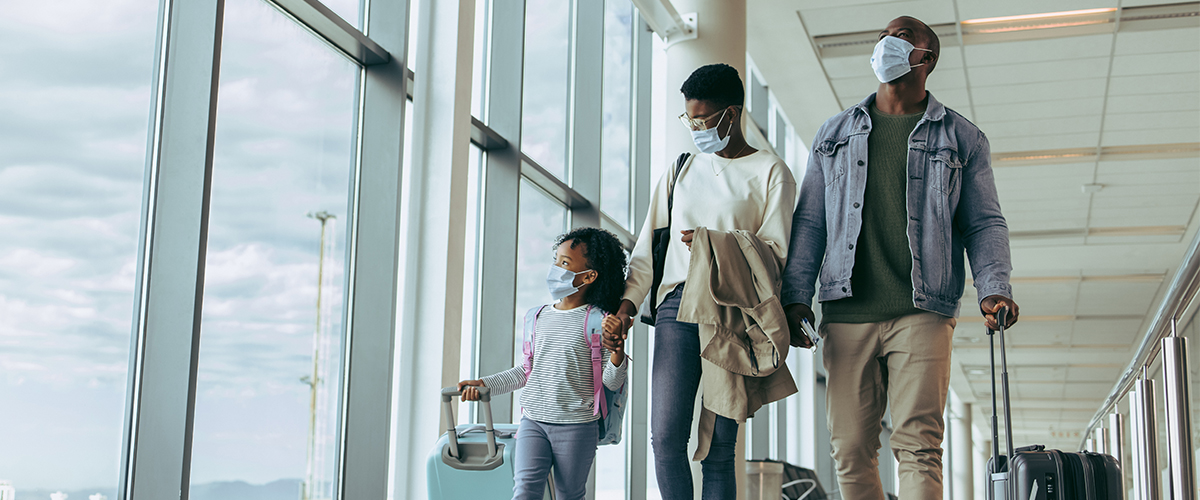Winter Travel Tips: How to Stay Healthy While Traveling
An infectious diseases expert shares tips to stay healthy while traveling during the winter season, especially amid high cases of COVID, the flu, and RSV.

This winter, traveling has not only resumed within the United States; it is surpassing pre-pandemic levels.
On December 21, 2022, 2.41 million travelers passed through U.S. airport checkpoints compared to 1.93 million in 2019, according to the Transportation Security Administration. With more people traveling to see loved ones and taking vacations, there is also an increased risk of getting sick, especially amid what is being called a tripledemic.
In recent weeks, COVID cases, hospitalizations, and deaths have increased in the U.S., according to the Centers for Disease Control and Prevention.
There has also been a spike in other respiratory infections such the flu and respiratory syncytial virus infection (RSV). While RSV is declining after peaking in the fall, infection rates persist across the U.S.
Taking precautions is key to remaining healthy and enjoying your travels, says Dr. Tina Z. Wang, who specializes in infectious diseases and hospital epidemiology at NewYork-Presbyterian/Columbia University Irving Medical Center.

Dr. Tina Z. Wang
“Winter is a valuable time to take trips and see family and friends, especially during the holidays,” says Dr. Wang. “It is important that we all do our part when it comes to staying healthy. That means getting vaccinated, tested, and wearing masks to reduce the spread of respiratory illnesses.”
“As we go into the winter holidays and the rest of the winter season, there is going to be increased travel and there is also going to be an increase in large group gatherings,” says Dr. Wang. “Following precautions can help ensure that everyone can stay healthy and have a safe and enjoyable holiday and winter period.”
Dr. Wang shares her top travel tips with Health Matters to help people stay healthy as they hit the road this winter.
Get Vaccinated and Boosted
Vaccination remains our greatest protection against respiratory viruses. In terms of COVID-19, being fully vaccinated and getting boosters is key. The bivalent booster is now available and recommended to almost everyone who is six months or older if it has been at least two months since your last COVID-19 vaccine. COVID-19 and flu vaccinations protect not only yourself but also helps to prevent transmission to others. For anyone who has not yet received their COVID-19 or flu vaccinations and boosters, I highly recommend getting them prior to any travel, or as soon as possible.
Wear a Mask
We knew early in the COVID-19 pandemic that masking can prevent transmission when out in public or in crowded areas. I think some of that mask-wearing has gone away over the last couple of months, but there is value in masking up. This is especially true during periods of higher transmission, like the one we are in now, and in times when there is going to be more crowding and gathering. Wear a mask, such as a surgical mask or KN95, in instances where you are traveling on a plane, train, bus, or subway; and whenever you are in a crowded area indoors.
Get Tested
If you’re traveling or attending a holiday gathering, try to test for COVID-19 before, as close as possible to the time of these events, and after. This is a good rule of thumb if you’re going to see older or younger people who may be more vulnerable to severe disease. Every U.S. household can order four free at-home COVID-19 tests this winter, according to the U.S. government. Order yours here.
What to Pack
Take masks, home antigen tests, hand sanitizer, and wipes with you while traveling. Decades of data show that good hand hygiene is effective in preventing the transmission of infectious diseases. A good first aid kit with any over-the-counter medications that you might need, such as Tylenol or ibuprofen, is helpful. If you have any chronic medical conditions, bring your medications and bring an extra supply as well. Make sure to have all information about your personal health readily available.
Keep a Schedule
Even though you’re traveling or perhaps in a different time zone, do your best to get on a regular schedule. The more well-rested you are, the stronger your immune system will be and the less likely you are to acquire infections. Take care of your body by exercising, eating healthy, staying hydrated, and getting enough rest.
Be Informed and Flexible
Keep up with the news in the destination where you are traveling, including being aware of COVID-19, flu, and RSV cases in the area. Have a contingency plan in case you get sick, or if you need to shorten or extend your stay. It is also a good idea to research the medical system of the place you are going to if it is abroad and think about travel insurance in case you become ill.
Tina Wang, M.D., specializes in infectious diseases and is an associate hospital epidemiologist at NewYork-Presbyterian/Columbia University Irving Medical Center. In addition to this, she spends a portion of her time in the inpatient clinical service at both NewYork-Presbyterian/Columbia and NewYork-Presbyterian Allen Hospital. She completed her fellowship training at Weill Cornell Medicine, where she worked closely with the hospital epidemiology teams at NewYork-Presbyterian/Weill Cornell Medical Center and NewYork-Presbyterian/Columbia, before joining the Columbia Infectious Diseases Division and Infection Prevention & Control Department in 2020.
Additional Resources
- Learn more about Travel Health and Travel Medicine Services.
